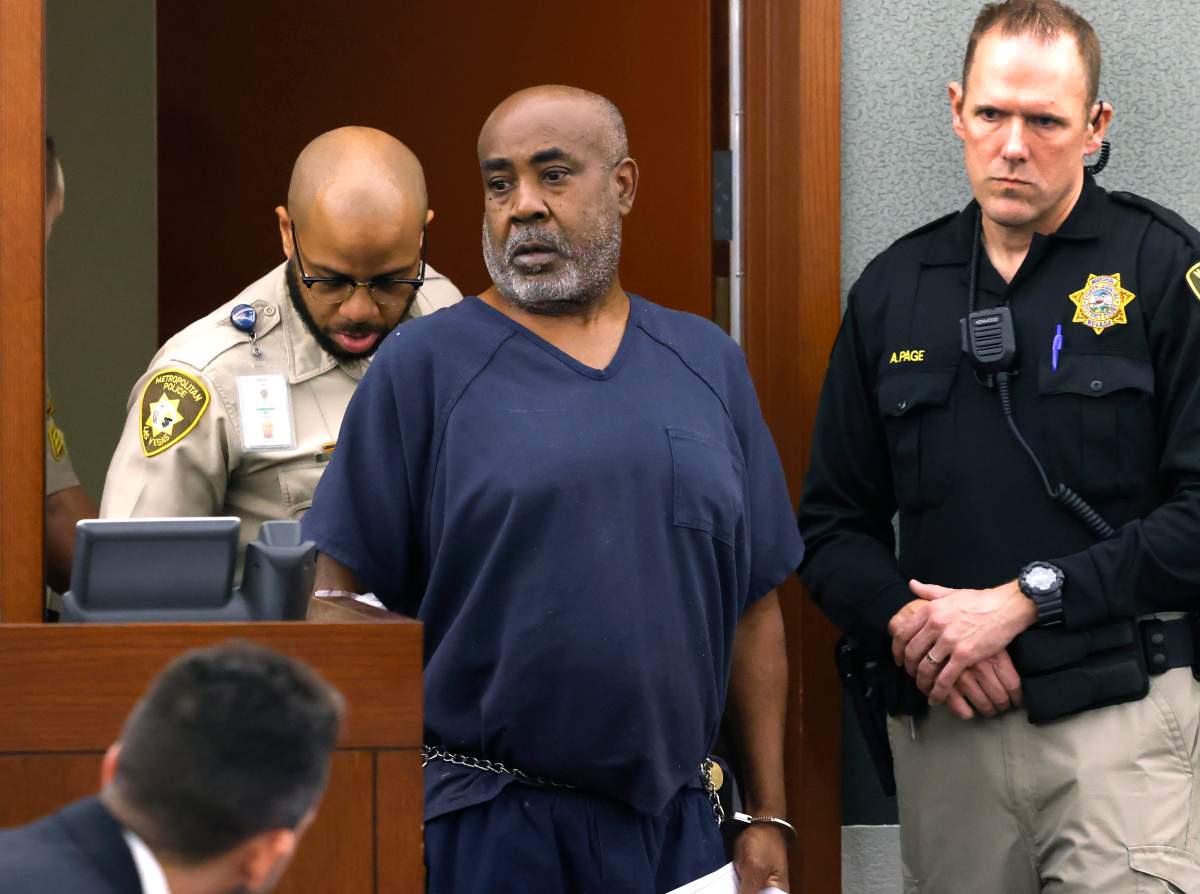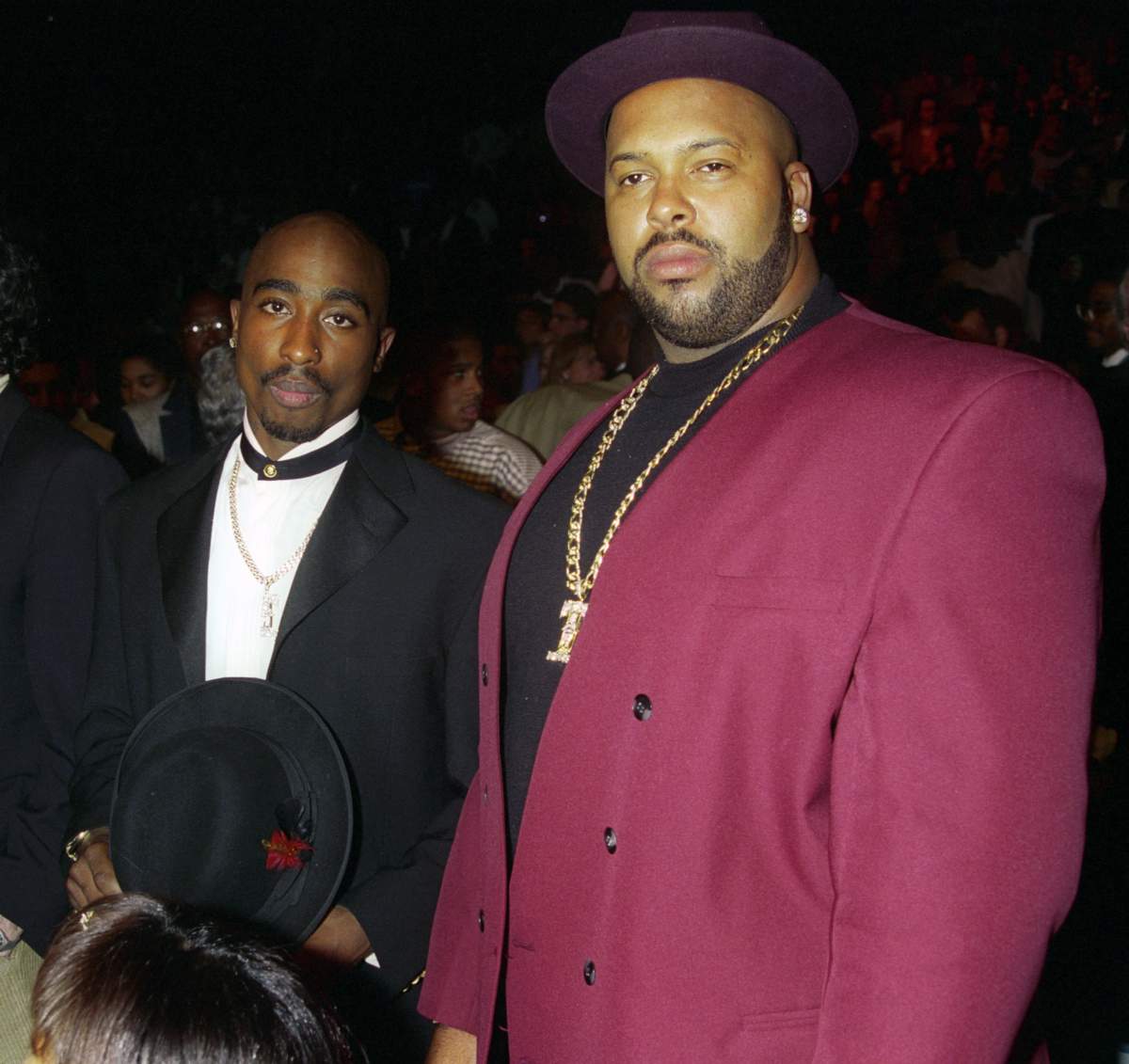Nearly three decades after Tupac Shakur was shot multiple times in a drive-by shooting in Las Vegas, a self-described “gangster” made his first court appearance to answer for the hip-hop legend’s death.

Duane “Keefe D” Davis, 60, stood shackled, wearing a dark-blue jail uniform and plastic orange slippers at the Wednesday hearing in Clark County.
Davis was scheduled to be arraigned on a murder charge for Shakur’s death, but the hearing was cut short after Davis asked Clark County District Judge Tierra Jones for a postponement while he retains a lawyer in Las Vegas.
Mopreme Shakur, the rapper’s stepbrother, wasn’t in court Wednesday, but he told The Associated Press that he’s been following developments in the case from his home in Los Angeles, even as he and his family are “trying to manage our expectations.”
“Young Black men often deal with delayed justice because we’re often viewed as the criminals,” he said. “So justice has been delayed for quite some time — in spite of all the eyes, all the attention, despite the celebrity of my brother.”
Last Friday, Davis was arrested near his home in Henderson, a suburb of Las Vegas. A few hours later, a grand jury indictment was unsealed in Clark County District Court charging him with murder.
Police and prosecutors say Davis masterminded the drive-by shooting that claimed Shakur’s life and injured rap music mogul Marion “Suge” Knight on Sept. 7, 1996.
Marc DiGiacomo, a chief deputy district attorney in Clark County, alleged Davis was the “on-ground, on-site commander” who “ordered the death” of Shakur and Knight in retaliation for an assault on Davis’ nephew.
Davis has been a long-known suspect in the case, and even publicly admitted his involvement in the killing in his 2019 tell-all memoir, Compton Street Legend. His own statements revived the investigation into Shakur’s death, police said.
“Them jumping on my nephew gave us the ultimate green light to do something,” Davis wrote in the memoir. “Tupac chose the wrong game to play.”

Get breaking National news
Davis notes in the memoir that he was in the vehicle that pulled up next to Shakur’s on that fateful night, and that he provided the gun used in the drive-by shooting.
But it wasn’t just Davis’ public statements that linked him to Shakur’s death. Now-retired Los Angeles police detective Greg Kading says Davis admitted his involvement to investigators in 2009 while they were probing the 1997 slaying of rapper Biggie Smalls, also known as The Notorious B.I.G.
Kading had helped build a federal drug case against Davis to get leverage to compel him to talk to Los Angeles police. Davis was given immunity for what he divulged in the 2009 police interview, though the exact details of the deal are unclear.
“He confesses to his involvement in the Tupac Shakur case, he gives all the details of how he and his co-conspirators killed Tupac,” Kading recalled in an interview Friday with The Associated Press.
While Davis’ words to police in 2009 can’t be used against him, what he said outside the interview room is fair game.
“The proffer agreement simply said that when you sit down and talk to us, whatever you say that is self-incriminating, we won’t use against you,” Kading said via NBC News.
“But when he leaves that room, that agreement doesn’t apply to everything else in his life, as he erroneously believed, so he began to go out and boast about his involvement in the murder. None of that’s protected under the agreement.”
“He has essentially talked himself right into jail,” Kading added.
Prosecutors in Nevada, however, will have to be careful not to rely on Davis’ admission to Los Angeles police as they argue their case, as this evidence wouldn’t be legally admissible.
Such a situation occurred in the high-profile case of comedian Bill Cosby, who was convicted in 2018 of drugging and assaulting Andrea Constand in 2004. Cosby was briefly jailed for the crime, but was released in 2021 after it came to light that the Montgomery County District Attorney’s Office had violated a prior agreement that it wouldn’t prosecute Cosby if he agreed to give a deposition in a civil matter.
The context of Tupac Shakur’s killing
Prosecutors allege Shakur’s killing stemmed from an East Coast vs. West Coast rivalry within the “gangsta rap” genre. It’s believed that Smalls’ death also arose from this rivalry.
Tensions between an East Coast sect of the Bloods gang and West Coast members of the Crips escalated in Las Vegas when a brawl broke out between Shakur and Davis’ nephew, Orlando “Baby Lane” Anderson, at the MGM Grand hotel-casino following a heavyweight championship boxing match won by Mike Tyson.
Knight and Shakur went to the fight, as did members of the South Side Crips, prosecutor DiGiacomo said last week in court. “And (Knight) brought his entourage, which involved Mob Piru gang members.”
After the casino brawl, Knight drove a BMW with Shakur in the front passenger seat. The car was stopped at a red light near the Las Vegas Strip when a white Cadillac pulled up on the passenger side and gunfire erupted.
Davis has said he was in the front passenger seat of the Cadillac and handed a .40-caliber handgun to his nephew in the back seat, from which he said the shots were fired.
Shot multiple times, Shakur died a week later at age 25. Knight was grazed by a bullet fragment but survived. Now 58, he is serving a 28-year prison sentence for running over and killing a Compton businessman outside a burger stand in January 2015.
Among the four people in the Cadillac that night, Davis is the only one who is still alive. Anderson died in a May 1998 shooting in Compton. Before his death, Anderson denied involvement in Shakur’s death. The other backseat passenger, DeAndre “Big Dre” Smith, died in 2004. The driver, Terrence “Bubble Up” Brown, died in a 2015 shooting in Compton.
— With files from The Associated Press













Comments
Comments closed.
Due to the sensitive and/or legal subject matter of some of the content on globalnews.ca, we reserve the ability to disable comments from time to time.
Please see our Commenting Policy for more.